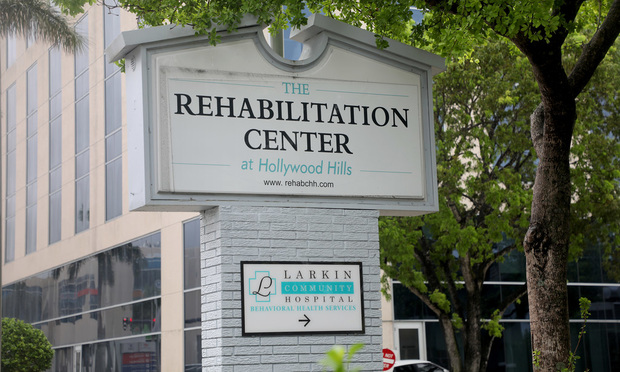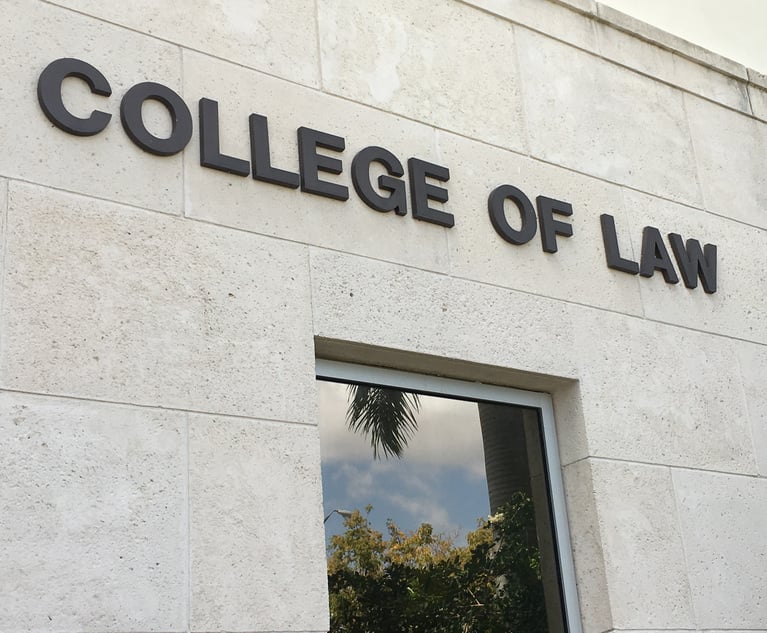House Committee Backs Rule for Nursing Home Generators
A House committee agreed to take steps to ratify a rule requiring nursing homes to have backup power sources but didn't endorse similar requirements for assisted living facilities because of concerns about the costs.
February 28, 2018 at 01:06 PM
4 minute read
 The Rehabilitation Center at Hollywood Hills, Hollywood, Florida.
The Rehabilitation Center at Hollywood Hills, Hollywood, Florida. A House committee agreed to take steps to ratify a rule requiring nursing homes to have backup power sources but didn't endorse similar requirements for assisted living facilities because of concerns about the costs.
Gov. Rick Scott in recent months has pushed for nursing homes and assisted living facilities to have generators that can keep buildings cool if electricity goes out.
McKinley Lewis, Scott's deputy communications director, told The News Service of Florida on Tuesday that assisted living facilities need to be “included” in the mix and that the governor's office is “continuing to work with the Florida Legislature to make sure this gets done.”
The House Health & Human Services Committee voted unanimously to introduce a bill that would ratify a rule issued by the state Agency for Health Care Administration, which regulates nursing homes. The proposed rule, which was hammered out by the Scott administration and the long-term care industry, would require nursing homes to have alternative power sources, such as generators, on site and 72 hours of fuel. The generators would need to be able to keep cool an area of no less than 30 square feet per resident at a temperature of 81 degrees Fahrenheit or lower for at least 96 hours.
The rule is estimated to cost nursing homes $121.3 million over the first five years, and about $66 million can be offset by Medicaid, according to a staff analysis. Agency for Health Care Administration Secretary Justin Senior told committee members that about $25 million of the $66 million Medicaid tab would be borne by the state.
Since 2010, Florida law has required legislative ratification of any rule that would increase the costs of doing business by more than $1 million over a five-year period.
House Health & Human Services Chairman Travis Cummings, R-Fleming Island, has repeatedly expressed concerns that requiring assisted living facilities to abide by backup power rules would result in an unfunded mandate on some of Florida's smallest businesses.
The 2,951 assisted living facilities in the state would have to spend more than $243 million to comply with the requirements.
Scott's administration has pushed for generators at assisted living facilities and nursing homes since the deaths in September of residents of The Rehabilitation Center at Hollywood Hills, a Broward County nursing home that lost its air-conditioning system in Hurricane Irma. But long-term care providers have raised repeated concerns about issues such as costs and requirements to store fuel.
Assisted living facilities are designed to provide services in a less-restrictive and more homelike environment than nursing homes. They range from one resident to several hundred residents and offer various types of personal and nursing services.
Senior told members of the House committee that in the days following Hurricane Irma, the state emergency operations center had nightly phone calls with long-term care providers and that the Agency for Health Care Administration sent facility-surveyor staff across the state to get a gauge on what was occurring.
Senior said 1,677 assisted living facilities reported that they lost power during Hurricane Irma. Senior said facilities without backup power tended to have what he called employee abandonment, or staff not showing up for work.
He said that the “lack of staffing really put some frail elders at risk.”
Moreover, Senior said, the state “saw [assisted living facilities ] residents, in particular, dumped inappropriately at special needs shelters and hospital emergency rooms.”
Cummings then asked Senior to focus on what was in the bill and not on assisted living facilities, which weren't included in the bill.
Christine Sexton reports for the News Service of Florida.
This content has been archived. It is available through our partners, LexisNexis® and Bloomberg Law.
To view this content, please continue to their sites.
Not a Lexis Subscriber?
Subscribe Now
Not a Bloomberg Law Subscriber?
Subscribe Now
NOT FOR REPRINT
© 2025 ALM Global, LLC, All Rights Reserved. Request academic re-use from www.copyright.com. All other uses, submit a request to [email protected]. For more information visit Asset & Logo Licensing.
You Might Like
View All
Florida Law Schools Are Seeing a Bump in Applications for 2025, After Recent Declines at Flagship Schools
3 minute read
Florida Judge Denies Motion to Dismiss in $150M Plane Crash Lawsuit Involving Flow La Movie
3 minute read
Trending Stories
- 1States Accuse Trump of Thwarting Court's Funding Restoration Order
- 2Microsoft Becomes Latest Tech Company to Face Claims of Stealing Marketing Commissions From Influencers
- 3Coral Gables Attorney Busted for Stalking Lawyer
- 4Trump's DOJ Delays Releasing Jan. 6 FBI Agents List Under Consent Order
- 5Securities Report Says That 2024 Settlements Passed a Total of $5.2B
Who Got The Work
J. Brugh Lower of Gibbons has entered an appearance for industrial equipment supplier Devco Corporation in a pending trademark infringement lawsuit. The suit, accusing the defendant of selling knock-off Graco products, was filed Dec. 18 in New Jersey District Court by Rivkin Radler on behalf of Graco Inc. and Graco Minnesota. The case, assigned to U.S. District Judge Zahid N. Quraishi, is 3:24-cv-11294, Graco Inc. et al v. Devco Corporation.
Who Got The Work
Rebecca Maller-Stein and Kent A. Yalowitz of Arnold & Porter Kaye Scholer have entered their appearances for Hanaco Venture Capital and its executives, Lior Prosor and David Frankel, in a pending securities lawsuit. The action, filed on Dec. 24 in New York Southern District Court by Zell, Aron & Co. on behalf of Goldeneye Advisors, accuses the defendants of negligently and fraudulently managing the plaintiff's $1 million investment. The case, assigned to U.S. District Judge Vernon S. Broderick, is 1:24-cv-09918, Goldeneye Advisors, LLC v. Hanaco Venture Capital, Ltd. et al.
Who Got The Work
Attorneys from A&O Shearman has stepped in as defense counsel for Toronto-Dominion Bank and other defendants in a pending securities class action. The suit, filed Dec. 11 in New York Southern District Court by Bleichmar Fonti & Auld, accuses the defendants of concealing the bank's 'pervasive' deficiencies in regards to its compliance with the Bank Secrecy Act and the quality of its anti-money laundering controls. The case, assigned to U.S. District Judge Arun Subramanian, is 1:24-cv-09445, Gonzalez v. The Toronto-Dominion Bank et al.
Who Got The Work
Crown Castle International, a Pennsylvania company providing shared communications infrastructure, has turned to Luke D. Wolf of Gordon Rees Scully Mansukhani to fend off a pending breach-of-contract lawsuit. The court action, filed Nov. 25 in Michigan Eastern District Court by Hooper Hathaway PC on behalf of The Town Residences LLC, accuses Crown Castle of failing to transfer approximately $30,000 in utility payments from T-Mobile in breach of a roof-top lease and assignment agreement. The case, assigned to U.S. District Judge Susan K. Declercq, is 2:24-cv-13131, The Town Residences LLC v. T-Mobile US, Inc. et al.
Who Got The Work
Wilfred P. Coronato and Daniel M. Schwartz of McCarter & English have stepped in as defense counsel to Electrolux Home Products Inc. in a pending product liability lawsuit. The court action, filed Nov. 26 in New York Eastern District Court by Poulos Lopiccolo PC and Nagel Rice LLP on behalf of David Stern, alleges that the defendant's refrigerators’ drawers and shelving repeatedly break and fall apart within months after purchase. The case, assigned to U.S. District Judge Joan M. Azrack, is 2:24-cv-08204, Stern v. Electrolux Home Products, Inc.
Featured Firms
Law Offices of Gary Martin Hays & Associates, P.C.
(470) 294-1674
Law Offices of Mark E. Salomone
(857) 444-6468
Smith & Hassler
(713) 739-1250







